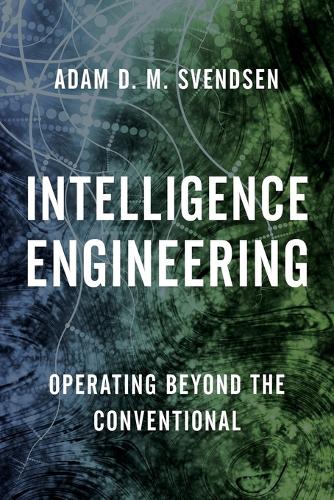
Intelligence Engineering: Operating Beyond the Conventional
(Paperback)
Available Formats
Publishing Details
Intelligence Engineering: Operating Beyond the Conventional
By (Author) Adam D. M. Svendsen
Bloomsbury Publishing PLC
Rowman & Littlefield Publishers
1st March 2017
United States
Classifications
Tertiary Education
Non Fiction
Political control and freedoms
Political science and theory
Military intelligence
327.12
Physical Properties
Paperback
158
Width 149mm, Height 231mm, Spine 10mm
231g
Description
Intelligence continues to undergo significant changes at a remarkable pace, notably developments related to Big Data, surveillance, and cyber. Intelligence today involves multiagency, multinational, multidisciplinary, multidomain information sharing and sense-making, conducted by commerce, academic, government, civil society, media, law enforcement, military, and nongovernmental/nonprofit organizations. Increasingly complex systems, including interrelated technical dimensions, are central to modern defense systems. Intelligence Engineering: Operating Beyond the Conventional provides a new framework for generating analysis, exploring how systems to system-of-systems can be harnessed both for and into the future. Intelligence engineering (IE) involves the use of scientific and technical knowledge to artfully create, operate, maintain, and dismantle complex devices, machines, structures, systems, and processes that support and/or disrupt human endeavor occurring in the intelligence context. Spanning both human and technical intelligence realms, IE includes the collection and analysis of information that is of military and/or political value, and that relates to international relations, defense, and national security. Strategic Futures, risk management across to resilience concerns, are similarly engaged.
Reviews
[Svendsen] provide[s] a substantial framework for enhancing the analysts view and understanding of the world. Nurtured carefully, this can be turned into a competitive advantage against any given target.... Adam D. M. Svendsen offers an original and interesting idea in this book. Moreover, he develops a framework for how this idea can bolster intelligence in the 21 century. His methodology and list of references reveals that coming up with this innovative framework has been no walk in the park and has taken years of expert research. * Global Readers' Club *
Adam Svendsen provides a new intellectual framework for generating analysis that meets the standard of being comprehensively exhaustive and mutually exclusive. As a practitioner and facilitator of Strategic Foresight Analysis, I believe the various systems of systems approaches described in the book are particularly valuable in helping students be more rigorous in identifying critical forces, factors, and events likely to shape future events. -- Randolph H. Pherson, former National Intelligence Officer for Latin America, CEO of Globalytica, LLC, and co-author of Structured Analytic Techniques for Intelligence Analysis
All security and intelligence scholars will find much to stimulate their thinking in this book. Its depth and scope, variety of intelligence systems explored and the advanced nature of the argument provokes considerable insight into the role of data and information in human systems. As he has done before, Svendsen once again helps us think more sophisticatedly about how modern and emergent intelligence is done. Intelligence Engineering is not only a discussion of how states seek to learn about other states or actors, but is instead a microcosm of the networked systems that we all live in today. -- David J. Galbreath, Centre for War and Technology, University of Bath
Author Bio
Adam D. M. Svendsen is an intelligence and defence strategist, educator, and researcher. He is an associate consultant at the Copenhagen Institute for Futures Studies, Denmark, and a co-founder and co-director of the Bridgehead Institute (Research & Consulting).
